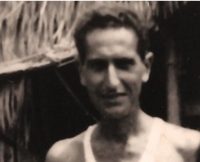Yesterday afternoon a Japanese plane looses off several bursts of machine-gun fire in the neighborhood. I make
the children, who are playing in the garden, take shelter.
The fires are still burning. Filipinos gather idly in front of the pretty Spanish church next door. In response to an order coming from goodness knows where, they set about pillaging the Chinese shops; the streets are filled with carretellas loaded with loot. It’s time to put an end to this period of uncertainty and disorder.
In the evening we listen to the radio from London: it informs us that if the Japs have achieved so much success, it’s because at no point have they met with sufficient resistance — which doesn’t get us very far!
This morning we were told over the telephone that the Japanese entered the city yesterday evening and are occupying the Manila Hotel, the High Commissioner’s residence. I try to telephone my hotel without success. I go off to the market where I find fish, bananas and tomatoes. No meat or rice. Prices have gone up tenfold. Then with Anne go to Paco market. We seem to be the only ones going in that direction; lots of people in the streets but all walking the other way. We’re overtaken by two cars in which Japanese officers are lounging — the first I’ve
seen since Saigon. Next to a shop selling charcoal there’s a checkpoint manned by a few Japanese soldiers. One of them is sitting in an armchair, right in the middle of the sidewalk, nonchalantly puffing a cigarette, his rifle resting on his arms. He looks without curiosity at the crowd of Filipinos passing by and doesn’t seem concerned at our presence. The other soldiers seem to be young; from time to time a car goes by flying a Japanese pennant. Anne and I give up the idea of going to Paco and take a carretella to go home. The Filipinos who see us in this native vehicle laugh — but without malice. On the whole, they seem relieved that the worry of the last few days is over. So far, the Japanese are behaving decently and the Filipinos are regaining confidence. Besides, they’re not afflicted by the misfortunes that have fallen on the Chinese and the Whites.
They’re here.
Anxiety gives way to a certain relief. First of all, the systematic looting has stopped. Then, until now they appear to be behaving like more or less normal people. Civilians don’t seem to interest them. They’re not raping women, not setting houses on fire, not indulging in drunken whisky orgies, and not looting shops. They reassure the population with benevolent proclamations, and timidly the inhabitants take the risk of going out. These look on their conquerors with curiosity and surprise. God, how ugly and small they are! They wear shorts that are too long — and still fail to hide their short bandy legs. Their walk is heavy and clumsy, as though their shoes are too heavy. The officers are weighed down even more by an oversized sword hanging at their side, looking as though it’s about to make them fall over. Their faces are hardly better. These Japanese look just like the caricatures in the American papers: shaved heads, glasses, and a mouth hanging permanently open, revealing enormous teeth.
